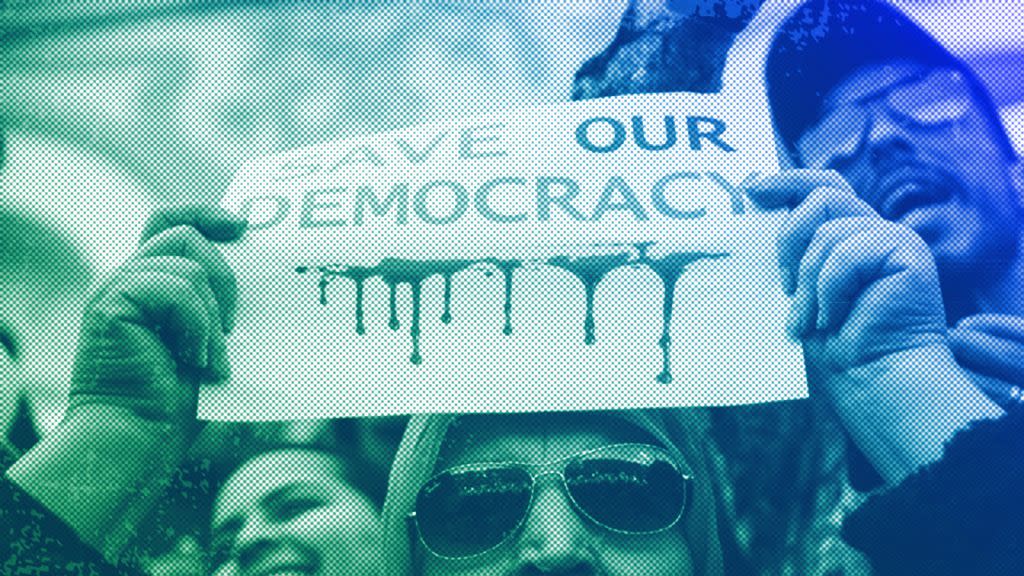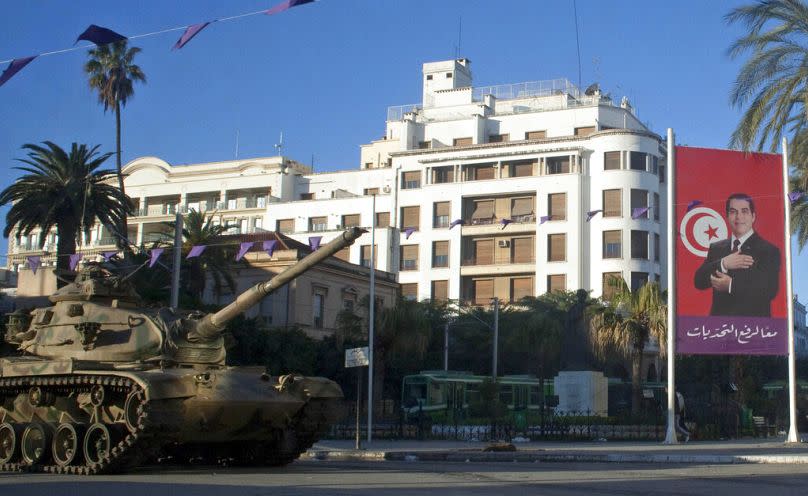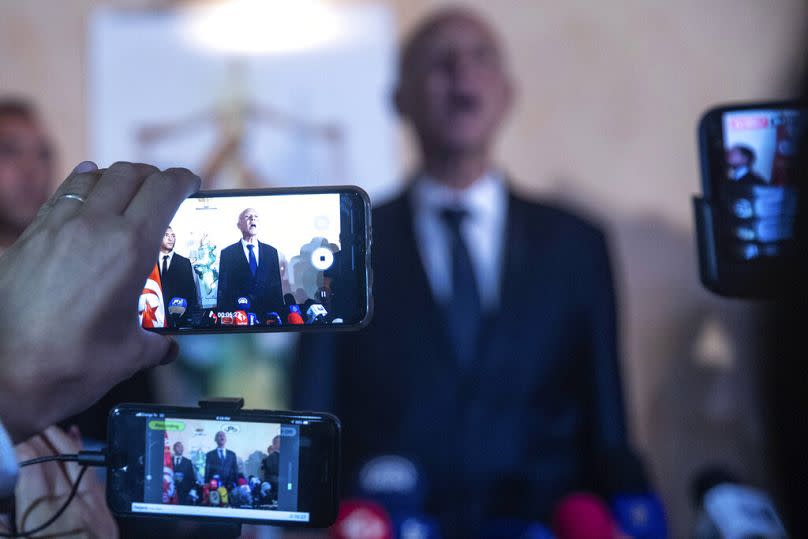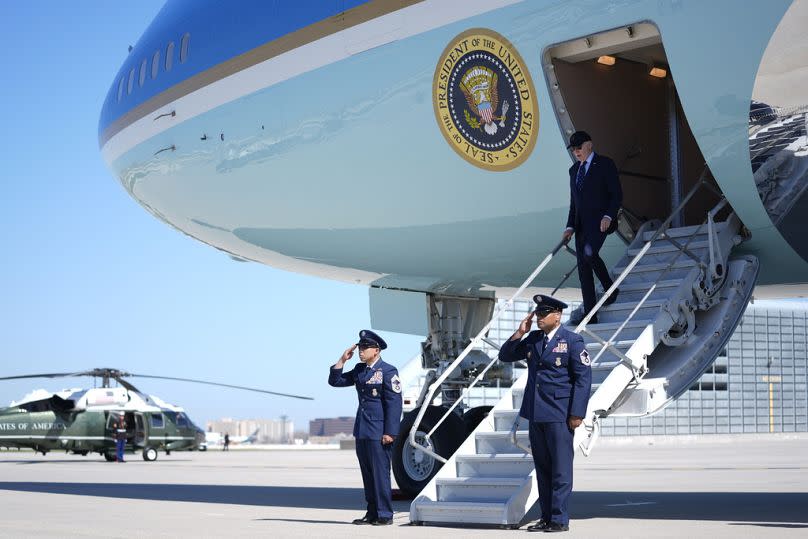Tunisia can still be a catalyst for global democratic reform

- Oops!Something went wrong.Please try again later.
- Oops!Something went wrong.Please try again later.
Tunisia, where I had the privilege to serve as the US ambassador during its revolution and the initial stages of its democratic transition, presents a unique opportunity for the United States and the European Union to demonstrate their commitment to democracy.
Having championed the country's revolution and democratic transition, the US and the EU must now reaffirm their support for Tunisia's democratic path.
When the European Commission offers funds to Tunisia as part of a migration and development deal it should ensure that this is not a short-term solution and doesn’t end up directly in the president’s hands, but that it is tied to conditions for a sustainable long term solution and rebuilding democracy in Tunisia.
Democracy can't slip away from Tunisians' grasp
Tunisia has an outsized importance in determining whether democracy will advance globally.
This is the nation that gave birth to the Arab Spring by overthrowing Zine El Abidine Ben Ali after 23 years of increasingly despotic rule.
Tunisians not only united to overthrow a dictator; they then came together to draft a constitution and to elect leaders who chose compromise over coercion.
But don’t just take my word for it; I well remember the late Senator John McCain telling me, when he visited Tunisia shortly after the revolution that, “if it can’t succeed here, it can’t succeed anywhere.”

Democracy in Tunisia though has been in decline under President Kais Saied. His de facto dissolution of parliament in July 2021, abandonment of the constitution, and targeting of opposition leaders, media, and activists are clear signs that Tunisia is no longer a democracy.
However, as Tunisia goes for elections this year, the Biden administration should clearly express — in both its public statements and its private diplomatic exchanges — the expectation that the 2024 Tunisian presidential ballot will be conducted as transparently as it was in 2019 and 2014.
Water restrictions, increased prices and imprisonment: How is Tunisia battling 5 years of drought?
By striking a deal with Tunisia's Saied, is Europe signalling it's open to extortion?
It should voice its desire to see the release of political leaders imprisoned on trumped-up charges — ranging from Islamist Rachid Ghannouchi to Ben Ali loyalist Abir Moussi. And call for the end of the harassment of journalists, which has persisted since the Ben Ali years.
Running hot and cold on foreign money
Furthermore, the Biden administration could use a range of economic carrots and sticks to encourage President Kais Saied to return Tunisia to its post-revolution democratic trajectory.
One such incentive would be reviving the $498.7 million (€459.3m) compact of the Millennium Challenge Corporation, a US foreign aid agency that makes grants to countries with strong economic policies and potential.

Approved right before President Saied’s 25 July 2021 power grab and suspended ever since, it would support much-needed improvements to Tunisia’s transportation, trade, and water sectors.
Helping Tunisia fix its economy is essential for democracy to succeed. As the latest Arab Barometer polling indicated, “Tunisians are more likely to associate ‘democracy’ with the provision of economic necessities.”
Tunisia must break free from reliance on short-term economic fixes
By striking a deal with Tunisia's Saied, is Europe signalling it's open to extortion?
President Kais Saied runs hot and cold on the International Monetary Fund’s $1.9 billion (€1.75bn) loan package — denouncing it as a “foreign diktat” even though his own government negotiated it.
However, Tunisia’s increasingly heavy international debt burdens may eventually force him to accept the package to avoid default. If and when that happens, the loan package would provide significant leverage to Western calls for truly fair elections.
Right now, all eyes are on Washington
Here it is crucial to note that for the US to push back against democratic backsliding in key countries, it must get its own house in order.
Political dysfunction in Congress only fuels the narrative propagated by authoritarians that democracies are incapable of meeting the needs of their people. Thus, prioritizing the interests of US constituents over short-term political gains is imperative for restoring global faith in democratic institutions.
Additionally, planning for the end of conflicts, such as the war in Gaza, is essential. The Biden administration must navigate complex geopolitical realities while upholding democratic principles and humanitarian values.

Global scrutiny of US diplomacy will only intensify as this horrific war is prolonged. Will the United States support an undemocratic Israeli occupation and an undemocratic Palestinian Authority?
How the Biden administration answers these questions (through its actions, not just its words) will be the true test of its commitment to advancing democratic norms throughout the world.
How to fix Tunisia’s economic misery with a fair and bold IMF program
In stunning move, Tunisia snubs Brussels and refunds €60 million in EU aid
While the challenges posed by conflicts in Gaza and Ukraine, as well as the rise of China, are significant, the US cannot afford to neglect the fight against democratic backsliding and authoritarianism which are key factors in the destabilization of nations and entire regions.
It is especially crucial to support democracy in the Middle East to foster stability, promote human rights, and mitigate the risk of further regional instability and conflicts.
Protecting Tunisia's democracy, a beacon of hope
While Freedom House has rightly sounded the alarm about the threats to democracy worldwide, it has also noted that “while authoritarians remain extremely dangerous, they are not unbeatable.”
The Tunisian people proved that when they launched the Jasmine Revolution. Friends of democracy throughout the world need to remember that lesson and continue to support them.
The Middle East’s conflicts have long had chilling reverberating effects on international security and stability.
The protection of Tunisia's democracy would stand as a beacon of hope. It would offer a compelling model for the entire Middle East and North Africa region to advance towards peace and prosperity, and showcase the transformative power of democratic ideals amidst tumultuous times.
Gordon Gray is the Kuwait Professor of Gulf and Arabian Peninsula Affairs at George Washington University’s Elliott School of International Affairs. He was a career Foreign Service officer who served as the US ambassador to Tunisia at the start of the Arab Spring and as Deputy Assistant Secretary of State for Near Eastern Affairs.
At Euronews, we believe all views matter. Contact us at view@euronews.com to send pitches or submissions and be part of the conversation.

